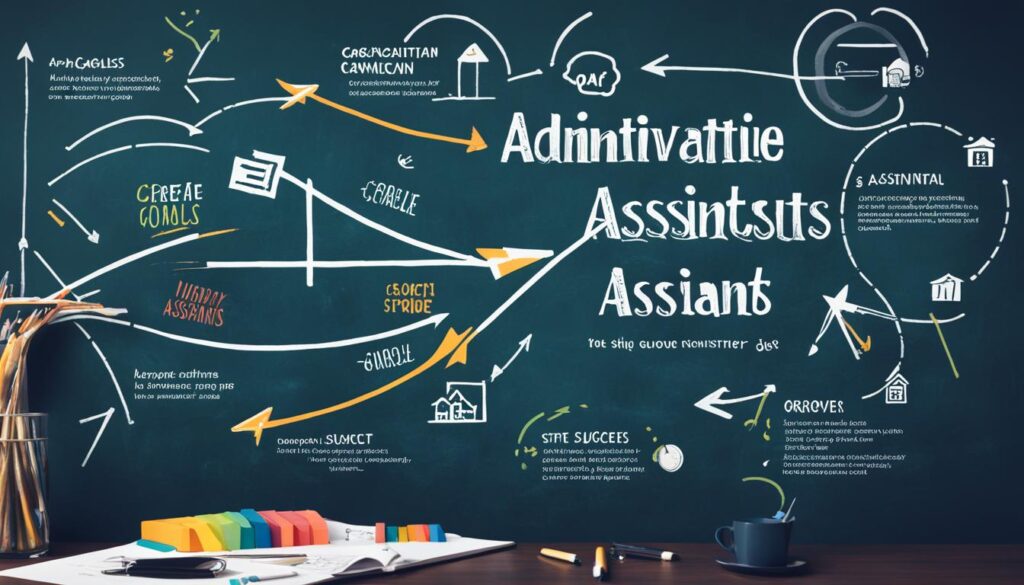Administrative assistants play a vital role in organizations, ensuring tasks are accomplished and processes are coordinated. To excel in this role, administrative assistants need to set measurable goals that align with their unique responsibilities and contribute to their career growth. These goals should be specific, measurable, achievable, relevant, and time-bound (SMART). In this article, we will explore 19 examples of SMART goals for administrative assistants that can enhance their efficiency, promote professional development, and lead to a successful career.
Key Takeaways:
- Setting measurable goals is crucial for administrative assistants’ career growth and success.
- SMART goals provide clarity and direction and prioritize tasks for administrative assistants.
- Professional development goals enhance administrative assistants’ skill sets and promote personal growth.
- Efficiency and productivity goals improve time management and streamline processes for administrative assistants.
- Communication and interpersonal skills goals help administrative assistants excel in collaboration.
The Importance of Setting Measurable Goals for Administrative Assistants
Setting SMART goals for administrative assistants is crucial for their career growth and job satisfaction. SMART goals, which are specific, measurable, achievable, relevant, and time-bound, provide clarity and direction for office assistants in prioritizing their tasks and improving their efficiency.
By setting goals that align with their job responsibilities and personal aspirations, office assistants can elevate their performance, increase their job satisfaction, and prepare themselves for greater responsibilities in the future.
“Setting goals is the first step in turning the invisible into the visible.” – Tony Robbins
When office assistants set specific goals, it allows them to focus their efforts and resources on what truly matters. They can break down their larger objectives into smaller, actionable tasks and milestones, making the path to success more manageable and achievable.
SMART goals also promote efficiency by providing a clear roadmap for office assistants. With each goal being measurable and time-bound, they can track their progress and make necessary adjustments to stay on track. This promotes a sense of accountability and discipline, leading to improved productivity and efficiency in their work.
Moreover, setting SMART goals enhances job satisfaction for office assistants. When they have a clear vision of what they want to achieve and work towards it, they experience a sense of purpose and fulfillment. Accomplishing milestones and reaching their goals boosts confidence and motivates them to chase higher levels of success.
Overall, setting SMART goals is an essential practice for assistants who aspire to grow in their careers and maximize their job satisfaction. By creating a roadmap to success and aligning their efforts with specific objectives, administrative assistants can enhance their efficiency, improve their performance, and unlock new opportunities for professional growth.
| Benefits of Setting SMART Goals for Administrative Assistants |
|---|
| 1. Career Growth: SMART goals provide a structured approach to career development, enabling administrative assistants to progress and take on higher-level roles. |
| 2. Efficiency: Setting goals helps administrative assistants prioritize tasks, streamline processes, and increase productivity. |
| 3. Job Satisfaction: Accomplishing SMART goals leads to a sense of fulfillment, job satisfaction, and increased motivation. |
| 4. Focus and Direction: SMART goals provide clarity and direction, ensuring administrative assistants stay on track and overcome obstacles. |
| 5. Continuous Improvement: By regularly setting and achieving goals, administrative assistants can continuously develop their skills and knowledge. |
Professional Development Goals for Administrative Assistants
Professional development plays a crucial role in the growth and success of assistants. By setting goals that focus on enhancing their skill set, administrative assistants can improve their effectiveness in their roles and advance their careers.
Here are some examples of professional development goals for administrative assistants:
- Attend training sessions or workshops to acquire new skills, such as project management or advanced software proficiency.
- Pursue certifications or qualifications relevant to their job, such as Certified Administrative Professional (CAP) or Microsoft Office Specialist (MOS).
- Seek opportunities for continuous learning and self-improvement through online courses, webinars, or industry conferences.
- Develop expertise in a specific area, such as event planning, budget management, or customer relationship management (CRM) systems.
- Enhance communication skills by taking courses in effective written and verbal communication, presentation skills, or conflict resolution.
By setting and actively pursuing these professional development goals, assistants can broaden their skill set, stay updated with industry trends, and position themselves for personal and career growth.
| Benefits | Description |
|---|---|
| Enhanced Efficiency | Continuous learning and skill enhancement enable assistants to perform their tasks more efficiently and effectively. |
| Increased Job Satisfaction | Advancing one’s skills and knowledge leads to a sense of accomplishment and fulfillment, contributing to higher job satisfaction. |
| Expanded Career Opportunities | By acquiring new skills and certifications, assistants become more marketable and open doors to new career opportunities. |
| Personal Growth | Professional development encourages personal growth, promotes a growth mindset, and fosters a sense of continuous improvement. |

Efficiency and Productivity Goals for Administrative Assistants
As an assistant, improving your efficiency and productivity is crucial for effectively managing your workload and achieving your professional goals. By setting specific goals that focus on enhancing your time management and streamlining your processes, you can optimize your workflow and maximize your output.
Here are some examples of efficiency and productivity goals for administrative assistants:
- Implement effective time management techniques to prioritize tasks and minimize time wastage.
- Develop systems to organize tasks, information, and files for easy access and retrieval.
- Find ways to automate or streamline repetitive administrative tasks, such as email templates or scheduling tools.
- Identify and eliminate bottlenecks in your workflow to increase efficiency and reduce delays.
- Improve your multitasking abilities by effectively prioritizing and juggling multiple tasks simultaneously.
- Enhance your communication skills to ensure clear and concise information exchange, reducing misunderstandings and errors.
- Utilize technology tools and software to simplify complex tasks and enhance productivity.
- Proactively seek opportunities to learn and develop new skills that can improve your efficiency and productivity.
By setting and actively working towards these efficiency and productivity goals, you can optimize your performance as an assistant, increase your value to the organization, and achieve greater job satisfaction.

Comparison of Efficiency and Productivity Goals
| Goals | Efficiency | Productivity |
|---|---|---|
| Implementing time management techniques | Improves task prioritization | Optimizes output |
| Developing organizational systems | Streamlines information retrieval | Reduces time spent on searching for files |
| Automating repetitive tasks | Minimizes manual effort | Increases time available for strategic work |
| Identifying workflow bottlenecks | Eliminates productivity barriers | Reduces delays |
| Improving multitasking abilities | Enhances task management | Increases task completion speed |
Communication and Interpersonal Skills Goals for Administrative Assistants
As an assistant, effective communication and strong interpersonal skills are essential for your role. You often act as a bridge between different departments and individuals within the organization, facilitating smooth collaboration and information exchange. To further enhance your communication skills and foster positive relationships, consider setting the following goals:
- Actively Seek Feedback: Make it a priority to seek feedback from colleagues, supervisors, and stakeholders. This will not only help you improve your communication effectiveness but also strengthen your relationships.
- Attend Workshops or Courses: Take advantage of workshops or courses that focus on improving presentation skills, negotiation techniques, or effective communication strategies. These opportunities can provide you with valuable tools to enhance your communication abilities.
- Establish Strong Relationships: Take the initiative to build strong relationships with your colleagues and stakeholders. Strive to foster trust, respect, and open lines of communication to create a positive work environment that encourages collaboration and teamwork.
By setting these goals, you can sharpen your communication skills, strengthen your interpersonal abilities, and become a more effective assistant. Remember, excellent communication and interpersonal skills are crucial for your success in this role and can contribute to a harmonious and productive work environment.

Goal Setting and Performance Evaluation Goals for Administrative Assistants
Goal setting and performance evaluation are crucial processes for assistants to ensure that they are on track and achieving their objectives. By setting clear goals and regularly evaluating their performance, assistants can align their work with the organization’s objectives, receive valuable feedback, and identify areas for improvement.
One goal for assistants is to regularly conduct self-assessments to evaluate their performance and progress. This allows them to reflect on their strengths, identify areas where they can improve, and take necessary steps to enhance their skills and abilities. Self-assessments also provide an opportunity for assistants to set new goals based on their findings and adjust their approach to work accordingly.
Seeking feedback from supervisors and colleagues is another important goal for administrative assistants. By actively soliciting feedback, administrative assistants can gain valuable insights into their performance, receive guidance on areas for improvement, and optimize their work processes. This feedback-driven approach promotes continuous learning and helps administrative assistants enhance their skills and effectiveness.
Regularly conducting self-assessments and seeking feedback are key components of goal setting and performance evaluation for administrative assistants.
Active participation in performance review discussions is also a goal that administrative assistants should strive for. By actively engaging in these discussions, administrative assistants can provide insights into their accomplishments, challenges faced, and goals achieved. This allows them to contribute to the evaluation process, demonstrate their commitment to their work, and showcase their growth and development over time.
Overall, goal setting and performance evaluation are essential for administrative assistants to drive their professional growth, refine their skills, and excel in their roles. By setting goals related to these processes, administrative assistants can enhance their performance, align their work with organizational objectives, and pave the way for their career advancement.
Benefits of Goal Setting and Performance Evaluation for Assistants
Goal setting and performance evaluation provide several benefits for administrative assistants:
- Clarity: Setting goals provides administrative assistants with clarity about their expectations and priorities, allowing them to focus their efforts effectively.
- Feedback: Regular evaluations and feedback help administrative assistants understand their strengths and areas for improvement, fostering personal and professional growth.
- Motivation: Having clear goals to work towards and receiving recognition for their achievements motivates administrative assistants to perform at their best.
- Career Advancement: Setting and achieving goals aids in demonstrating competence, dedication, and value, leading to increased opportunities for career advancement.
In conclusion, goal setting and performance evaluation play a vital role in the success of administrative assistants. By setting goals, seeking feedback, and actively participating in performance evaluation discussions, administrative assistants can enhance their performance, align with organizational objectives, and pave the way for their career advancement.

| Goal | Description |
|---|---|
| Regular self-assessments | Conduct self-assessments to evaluate performance, identify strengths, and areas for improvement. |
| Seek feedback | Proactively seek feedback from supervisors and colleagues to gain insights and improve performance. |
| Active participation in performance review discussions | Conduct self-assessments to evaluate performance, and identify strengths, and areas for improvement. |
Career Growth Goals for Administrative Assistants
As an assistant, setting career growth goals is essential for your long-term professional advancement. By establishing clear objectives, you can develop the necessary skills, knowledge, and experience to move up the career ladder and achieve your aspirations. Here are some examples of career growth goals that can help you excel in your role:
- Seeking Opportunities for Job Rotation or Cross-Functional Assignments: By exploring different roles within your organization or taking on assignments in other departments, you can gain valuable experience, expand your skill set, and showcase your versatility.
- Pursuing Advanced Education or Professional Certifications: Investing in your education and obtaining relevant certifications can enhance your expertise and open doors to new opportunities. Consider pursuing courses or programs that align with your career goals and can provide you with a competitive edge.
- Actively Networking Within Your Industry: Building connections with professionals in your field can create valuable opportunities for mentorship, collaboration, and job referrals. Attend industry events, join professional associations, and engage with online communities to expand your network.
By setting and working towards these career growth goals, you can position yourself for success and professional advancement as an assistant. Remember, continuous learning and proactive networking are crucial in today’s competitive job market.
Take the initiative to pursue new challenges, acquire new skills, and build meaningful connections that will propel your career forward.
Conclusion
Setting SMART goals is essential for administrative assistants to enhance their performance, boost efficiency, and achieve their career aspirations. By setting specific, measurable, achievable, relevant, and time-bound goals, assistants can focus their efforts, track their progress, and make meaningful contributions to their organizations.
With the 19 examples of SMART goals provided in this article, administrative assistants can take the first step toward career growth and professional excellence. Whether it’s developing new skills, improving communication and interpersonal abilities, or streamlining processes for increased efficiency, these goals can empower administrative assistants to reach their full potential and succeed in their roles.
By continuously setting and evaluating these goals, assistants can stay motivated, maintain a clear direction, and continuously improve their performance. As they strive to accomplish their SMART goals, administrative assistants will not only become more valuable assets to their organizations but also open doors to new opportunities for advancement and career progression.
FAQ
What are SMART goals?
SMART goals are goals that are specific, measurable, achievable, relevant, and time-bound. They provide clarity and direction, helping administrative assistants prioritize their tasks and improve their efficiency.
Why are SMART goals important for administrative assistants?
SMART goals are crucial for administrative assistants as they contribute to their career growth, job satisfaction, and effectiveness in their role. These goals help align their work with organizational objectives and track their progress.
What are some examples of professional development goals for administrative assistants?
Examples of professional development goals for administrative assistants include attending training sessions or workshops, pursuing certifications relevant to their job, and seeking opportunities for continuous learning and self-improvement.
How can administrative assistants improve their efficiency and productivity?
Administrative assistants can improve their efficiency and productivity by implementing effective time management techniques, developing systems to organize tasks and information, and finding ways to automate or streamline repetitive administrative tasks.
What are some communication and interpersonal skills goals for administrative assistants?
Examples of communication and interpersonal skills goals for administrative assistants include actively seeking feedback to enhance communication effectiveness, attending workshops or courses to improve presentation or negotiation skills, and establishing strong relationships with colleagues and stakeholders.
How can administrative assistants set goals related to goal setting and performance evaluation?
Administrative assistants can set goals related to goal setting and performance evaluation by regularly conducting self-assessments, seeking feedback from supervisors and colleagues, and actively participating in performance review discussions.
What are some career growth goals for administrative assistants?
Examples of career growth goals for administrative assistants include seeking opportunities for job rotation or cross-functional assignments, pursuing advanced education or professional certifications, and actively networking within their industry.
How can administrative assistants set SMART goals for their career growth?
Administrative assistants can set SMART goals for their career growth by ensuring their goals are specific, measurable, achievable, relevant, and time-bound. This will help them track progress and make meaningful contributions to their organizations.





